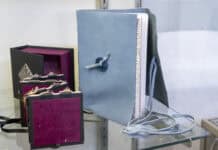Beats, bass and melodies have room to breathe in record producer Mike Lattanzi’s West Sedona home.
Larson Newspapers
Beats, bass and melodies have room to breathe in record producer Mike Lattanzi’s West Sedona home.
Behind closed doors in his second-floor recording studio, Lattanzi cranks the dials on his mammoth mixing board and drags tracks in and around his Apple computer.
Guitars line the wall, and keyboards and drum modules are always within reach.
Lattanzi is open to collaboration, he said, but in most cases, he writes, records and plays everything on his own.
Jon Carin, a keyboardist known for performing with Pink Floyd for more than 20 years and even co-writing the song “Learning to Fly,” first convinced Lattanzi he didn’t need a band to write music. He could just play everything himself.
Lattanzi was 18 years old, working as a busboy in a New York City restaurant, when Carin, only 15, popped a cassette into his car’s
tape deck.
The music was good, Lattanzi said, and he was shocked to find out that Carin played every instrument on the recording — drums, bass, guitars, vocals and all.
Lattanzi was on his way to work at the time, he said, but he insisted Carin show him how he did it. Carin agreed. He took Lattanzi to his house, pulled the sheet off of his mixing board, and demonstrated some multi-track recording that changed Lattanzi’s life.
“I went to work for about 10 minutes and then just left,” Lattanzi said. “I quit, went back to [Carin’s] house, and started writing songs.”
Like Carin, Lattanzi knew he couldn’t rely on many local musicians, so he began playing all the instruments himself, he said.
He never took any lessons, but he quickly learned the drums, stepped up his guitar playing and developed production techniques strong enough to build songs from the ground up.
Lattanzi kept himself busy for years before a Mariah Carey demo tape fell into his hands.
Carey was only 16 years old at the time, according to Lattanzi, and she was totally unsigned.
Lattanzi wanted her to be the first artist he signed to his new label, so he and his partner, Monte Lipman, traveled to Los Angeles to try finding someone to give them the money to record her.
They wrote a proposal and a business plan, and wore suits and ties to their first meeting with a stock trader whom they figured had money to spare.
“We must have looked like idiots,” Lattanzi said, laughing at the memory. “The guy just chewed us up.”
“Why would I give you a hundred grand when I can take a hundred grand and actually make money with it?” the guy asked them.
Nevertheless, he liked Lattanzi and Lipman, and said he’d like to help them in the future, but the two signed a different artist a short time later and forgot about the whole thing, Lattanzi said.
Lipman wound up getting a job with a record label and he’s now the president of Universal Records.
Lattanzi took a different road. From his home studio, he fed record companies with an endless stream of material and artists to sign.
He worked with artists like Steve Vai, Wyclef Jean, Jewel, Nick Lachey, Jessica Simpson, Smashmouth and Robbie Williams.
All was well. Lattanzi was on top of the world when he fell 25 feet to the ground in a mountain biking accident and lost the use of his legs.
In the hospital, dazed by the accident and the potent painkillers he was forced to take, Lattanzi’s life was in limbo.
When he was released from the hospital, his doctor weened him of the painkillers. Then, the depression set in.
Lattanzi had a beautiful home and plenty of things to do, but none of it seemed to matter anymore, he said. He didn’t want to work. He didn’t want to play. He didn’t want to do much of anything.
His doctor, Robert Pashman — a man Lattanzi refers to as his hero and the man who saved his life — suggested he try getting back into the studio to record his son, Daniel Pashman, a 16-year-old student at Beverly Hills High School who writes and plays alternative rock music, and Lattanzi agreed.
He returned to the studio and life soon fell back into place, Lattanzi said. He’s still working on Pashman’s next release, but not in Los Angeles
Lattanzi was worried he’d be on his own when he moved his studio to Sedona, but his wife and manager, Kathy Lattanzi, assured him musicians would follow him out here.
She was right. They have.
“I have a lineup,” Lattanzi said. “It’s ridiculous. The phone doesn’t stop ringing.”
Of course, many musicians have their reasons for being in Los Angeles, but some of them want to get away from all that, Lattanzi said — free of distractions and able to focus solely on the music.
National recording artists are lining up to get into Lattanzi’s studio and he’s already picked up a handful of local musicians he intends on recording, he said.
As much as Lattanzi enjoys working with the big acts, he gets the most satisfaction out of finding new talent, he said.
“First, I’ll always see what they have. And then hopefully, I’ll try to expand on that and turn it into something,” Lattanzi said.
Whatever he chooses to do, he takes his time, he said. Most musicians appreciate that, but occasionally, they don’t want to wait.
“You know what? Don’t work with me then,” Lattanzi tells them, “because it’s got to be perfect.”
Musicians count on producers to make them sound as good as possible, and even if Lattanzi knows a song is going nowhere, he still takes the time to get it right, he said.
However, a lot of producers are really rough on their clients, according to Lattanzi. He’s seen thick-skinned musicians cry over the harsh things producers have said to them.
Lattanzi, however, said he takes a different approach.
He knows when a performance isn’t there yet, he said, but he’s not in the business of crushing egos. He’d rather do whatever he can to get the best performance out of the musicians he records.
“You have to be a psychiatrist big time, because you can really crush people’s confidence,” Lattanzi said.
Without that confidence, the attitude won’t come through in the music and that’s important, he said.
“That’s the east coast in me,” Lattanzi explained. “You’ve got to have that attitude come out …. The attitude to me is the main thing.”
And Lattanzi’s own attitude — mixed with his dedication and expertise — has helped him get to where he is today. He tells people he got lucky, but there’s more to the story.
As things begin to speed up in Lattanzi’s studio, feeling and mobility are returning to his legs.
Lattanzi is determined to walk again, he said, and if the heart he puts into his music and into his life are any indication, he most definitely will.
For more information about Lattanzi and his studio, visit www.michaellattanzi.com.
Tyler Midkiff can be reached at 282-7795, Ext. 122, or e-mail to tmidkiff@larsonnewspapers.com.


















